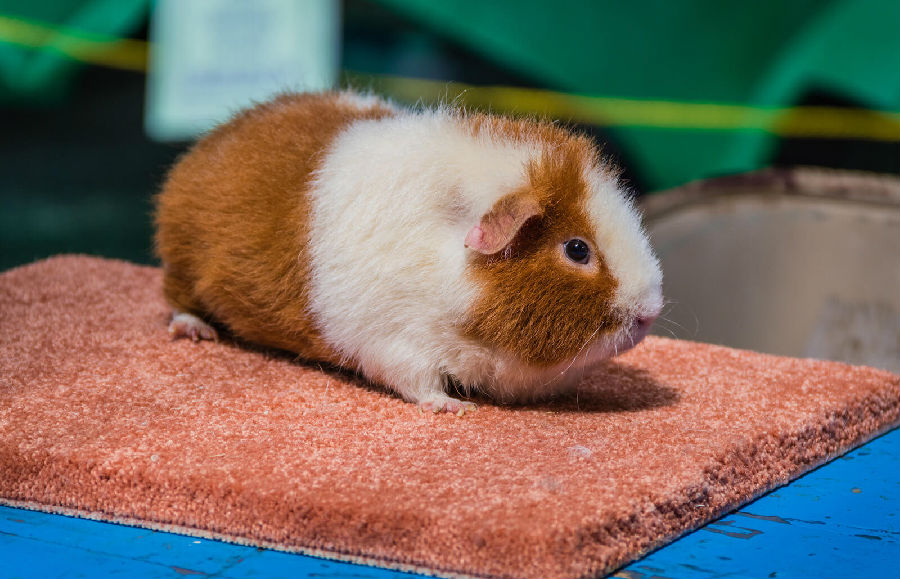(单词翻译:单击)
听力文本
Now, the VOA Learning English program Words and Their Stories.
Each week, we explain where American English expressions come from and how to use them.
Today, we turn once again to the animal world. We talk about an animal that has been a great service to humanity: the Guinea pig.
Guinea pigs are native to South America. Some people say the small, very social creatures got their name from the fact that they make noises like a pig. Another reason, they say, is that guinea pigs first left their homeland on ships that sailed between South America, Guinea and Britain.
Other experts suggest that guinea pigs look like the young of another animal: the Guinea hog, also called the "river pig."
Over the years, guinea pigs have earned our respect. They have, after all, played an important part in keeping people healthy.
For two centuries, they have been used for medical research. Their natural defenses against disease are similar to that of human beings. Scientists used guinea pigs in early studies of infectious diseases, such as tuberculosis and diphtheria. Today they are often used in studies of sexually transmitted and other infectious diseases.
Rats are also used for laboratory experiments. But, as it turns out, Guinea pigs have more in common with people than rats do. So they are a better choice for some studies.
These experiments have led to the use of "guinea pig" in the English language.
Some say that the term guinea pig, meaning "one subjected to an experiment," was first used in the 1920s. And this expression is still very common today.
If someone calls me a "guinea pig," it means that new ideas or methods are tested on me. I am part of some kind of experiment and it does not have to be one in a laboratory.
Let's hear this expression used in some examples.
I have some new dishes to serve at my big dinner party! But I've never made them before. What if they don't taste good?
How about if I come over this weekend and you can cook them for me?
Great idea! You can be my guinea pig!

You can call me whatever you want. As long as I get to eat your great cooking!
This milk smells funny. Will you try it and see if it's old?
Ew. No! I'm not your guinea pig. Try it yourself!
The city government is trying out a new recycling program. It is the first of its kind in the nation.
Argh. Not again! Why must our city be a guinea pig for every 'great' idea our politicians hear about?
And yes, I said 'great' with quotes because they're not great at all!
Yes. I heard your quotation marks.
Good.
The expression, "guinea pig" carries a lot of meaning with only two words. Calling yourself a "test subject," sounds way too scientific. And we just do not use it that way.
A similar term, "lab rat," is rarely used and it does not sound very nice. And saying that you "are being experimented on to see if something works" is so very...long.
Guinea pig is much more common and you can use it in any situation.
Well, the only time you may not want to use "guinea pig'" to mean a lab animal, is when speaking to someone from PETA, People for the Ethical Treatment of Animals. They may not like it.
Another person who may not like this expression is someone who takes care of one as a pet. That's right. These animals do much more than help in scientific research. In the United States, many people own one or more guinea pigs, much like you would a dog or cat!
And that's all the time we have for Words and Their Stories.
Until next time! I'm Anna Matteo.
重点解析
1.after all 终究;最后
We've decided not to go away after all.
他日复一日地努力工作着。
2.turn out 结果是;原来
No one could have foreseen things would turn out this way.
谁都没有预料到事情的结果会这样。
3.take care of 照料;爱护
He's well able to take care of himself.
他完全能够自理。
参考译文
欢迎收听VOA慢速英语《词汇掌故》。
每周,我们都会解释美式英语表达的来源和用法。
今天,我们再次回到动物世界。我们谈论的是一种为人类做出巨大贡献的动物:豚鼠。
豚鼠原产于南美洲。有人说,这种小型、非常社会化的生物之所以得名,是因为它们发出像猪一样的声音。也有人说,另一个原因,豚鼠第一次离开它们的家园,乘船在南美洲、几内亚和英国之间航行。
其他专家认为,豚鼠看起来像另一种动物的幼崽:几内亚猪,也称为“河猪”
多年来,豚鼠赢得了我们的尊敬。毕竟,它们在保持人们健康方面起了重要作用。
两个世纪以来,它们一直被用于医学研究,它们对疾病的天然防御能力与人类相似。科学家在早期的肺结核和白喉等传染病研究中使用豚鼠。今天,它们经常被用于性传播疾病和其他传染病的研究。
科学家也把老鼠用于实验室实验。但是,事实证明,与老鼠相比,豚鼠与人有更多的共同点。因此,它们是一些研究的更佳选择。
这些实验使英语中使用了“guinea pig(豚鼠)”。
有人说,豚鼠这个词最早出现在20世纪20年代,它的意思是“接受实验的人”,而这个表达在今天仍然在普遍使用。
如果有人叫我“豚鼠”,就意味着在我身上测试新想法或新方法。我是某种实验的一部分,不一定是在实验室里进行的实验。
让我们听听这个表达式在一些例子中的用法。
我要在大型宴会上供应一些新菜品!但我以前从没做过这些菜,如果味道不好怎么办?
如果我这个周末过来,你可以做给我吃吗?
好主意!你可以做我的豚鼠!
你叫我什么都行,只要我能吃到你的美味佳肴就行!
这牛奶闻起来很怪,你能试试看它是不是过期了吗?
呃,不!我不是你的豚鼠,你自己试试吧!
市政府正在试行一项新的回收计划,这在全国尚属首例。
啊,别再这样了!为什么我们的城市一定要成为政客们听说的每个“伟大”想法的试验品?
是的,我说“很好”时用了引号,因为它们一点都不好!
对,我听出你的引号了。
好的。
“豚鼠”这个词只有两个单词,却拥有很多含义。称自己为“test subject(测试对象)”,听起来太科学性了,我们不这么使用。
一个类似的词“lab rat(实验室小白鼠)”很少使用,听起来也不太好。而且说“正在拿你做试验,看看有没有什么效果”,这样的句子实在是太长了。
豚鼠更常见,你可以在任何情况下使用它。
嗯,你唯一不想用“豚鼠”来指实验动物,是在和善待动物组织(PETA)的人交谈的时候。他们可能不喜欢这样的表达方式。
另一个可能不喜欢这种表达的人,是把豚鼠当作宠物来照料的人。这没错,这些动物在科学研究中所做的不只是一点帮助而已。在美国,许多人拥有一只或多只豚鼠,就像养狗或猫一样!
这就是我们今天的节目。
下期节目再见!我是安娜·马特奥。


